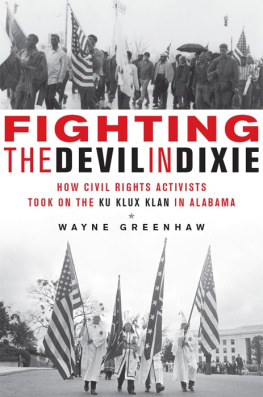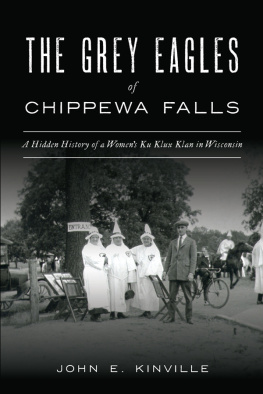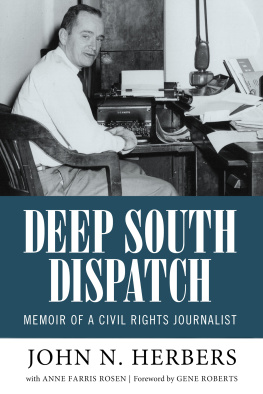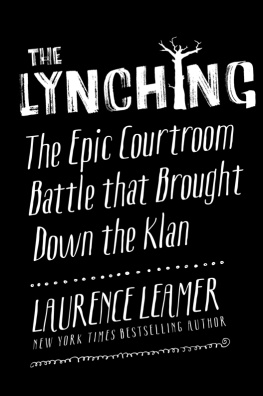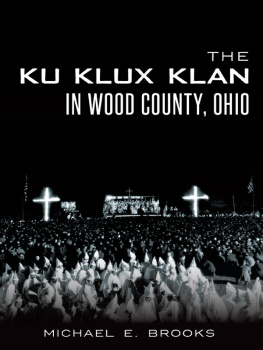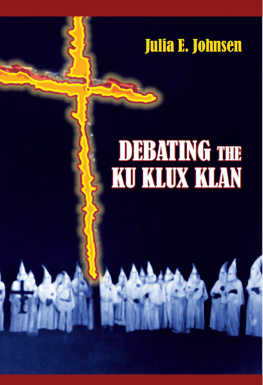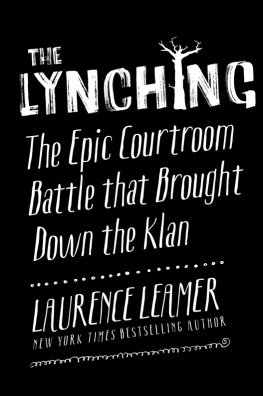A LSO BY W AYNE G REENHAW
NONFICTION
A Generous Life: W. James Samford (2009)
The Thunder of Angels: The Montgomery Bus Boycott and the People Who Broke the Back of
Jim Crow with Donnie Williams (2006)
My Heart Is in the Earth: True Stories of Alabama and Mexico (2001)
Alabama: A State of Mind (2000)
Beyond the Night: A Remembrance (1999)
Alabama: Portrait of a State (1998)
Montgomery: The Biography of a City (1993)
Montgomery: Center Stage in the South with Kathy Holland (1990)
Alabama on My Mind (1987)
Flying High: Inside Big-Time Drug Smuggling (1984)
Elephants in the Cottonfields: Ronald Reagan and the New Republican South (1981)
Watch Out for George Wallace (1976)
The Making of a Hero: Lt. William Calley and the My Lai Massacre (1971)
NOVELS
The Long Journey (2002)
King of Country (1994; revised edition 2004)
Hard Travelin (1972)
The Golfer (1968)
SHORT FICTION
The Spiders Web: A Novella and Stories (2003)
Tombigbee and Other Stories (1992)
POETRY
Ghosts on the Road: Poems of Alabama, Mexico and Beyond (2007)
DRAMA
The Spirit Tree: F. Scott & Zelda Fitzgerald in Montgomery
Rose: A Southern Lady

Library of Congress Cataloging-in-Publication Data
Greenhaw, Wayne, 1940
Fighting the devil in Dixie : how civil rights activists took on the Ku Klux Klan in Alabama / Wayne Greenhaw.
p. cm.
Includes bibliographical references and index.
ISBN 978-1-56976-345-2 (hardcover)
1. African AmericansCivil rightsAlabamaHistory20th century.
2. AlabamaRace relationsHistory20th century. 3. Ku Klux Klan (1915-)AlabamaHistory. I. Title.
E185.615.G687 2011
323.11960730761dc22
2010030114
Interior design: Jonathan Hahn
2011 by Wayne Greenhaw
All rights reserved
Published by Lawrence Hill Books
An imprint of Chicago Review Press, Incorporated
814 North Franklin Street
Chicago, Illinois 60610
ISBN 978-1-56976-345-2
Printed in the United States of America
5 4 3 2 1
In memory of our friends
I RMA F EGAS , S TAN R ICHMAN ,
T OM C ORK, AND C LAUDE D UNCAN
Aint nobody gonna turn me round,
Ill keep a-walkin, Ill keep a-talkin,
Marching up to freedom land.
M ARCHING UP TO F REEDOM L AND
O, deep in my heart,
I do believe,
We shall overcome some day.
W E S HALL O VERCOME BY R EVEREND C HARLES
T INDLEY WITH G UY C ARAWAN AND P ETE S EEGER
CONTENTS
Like a Mighty Stream
AUTHORS NOTE
I look back on a world suffering from racial schizophrenia.
In the aftermath of the federal courts ruling that ended legal segregated public education, most white adults in my home state of Alabama were silent while a small minority rode nightly, terrorizing black people, bombing houses and churches, castrating and killing. The silent whites simply demanded that their children go to school, come home, and stay out of trouble.
But there was another reaction to the violence. That story is a long and twisting road through emotional hills and hollows. As it moves around curves and through unseen pitfalls, we see the number of black attorneys in Alabama increase from four to five, six to seven, and more. As the roads become bumpy and dangerous, a few Southern white attorneys blossom in Alabama and fight the good fight next to their African American brothers and sisters.
Fighting the Devil in Dixie is the story of these people and their struggle.
PREFACE
DEATH ON THE HIGHWAY: A RECOLLECTION
My own parents never condoned violence and admonished their children to be good, law-abiding citizens. Still, we grew up in a segregated world decorated with WHITE ONLY and COLORED ONLY signs in places of public convenience.
As a boy, I watched my own kin march in a parade in their Ku Klux Klan gowns and pointed hoods. I listened to racist stories told around a midnight campfire. I recorded many of those gruesome tales in memory.
Several days before my sixteenth birthday I saw an angry mob screaming and shouting in protest when a young woman attempted to become the first black student at the University of Alabama.
For more than ten years, from the summer of 1965 until the spring of 1976, I covered politics and civil rights for the Alabama Journal, Montgomerys afternoon newspaper. I also wrote columns for the Sunday Advertiser-Journal, a combination of the morning and afternoon newspapers owned by the same company. During that time I was also a stringer for the New York Times, Time magazine, and numerous other publications.
Beginning in the summer of my twenty-fifth year, I covered marches in Montgomery and throughout central Alabama. One afternoon in Prattville, about fifteen miles northwest of Montgomery, I got out of my car on a downtown street where African American marchers were gathered. For the first time, I carried my new camera. As I headed down the sidewalk, a petite elderly white woman approached me. As she neared, she snarled, You a Yankee photographer, down here causing trouble. Suddenly she began beating me with a very large purse. A policeman stepped between us and told the woman to leave. Never again did I carry my camera to a demonstration. After that incident I had much more respect for the photographers who covered civil rights in the South.

About a year after I started reporting for the Journal, I received a telephone call early on a Sunday morning. The caller would not identify himself. Theres been a killing up here in Elmore County. This killing took place a few hours ago on the side of Highway 231. A white deputy sheriff hit a black man over the head. I saw it. Blood spurted everywhere. They took him to the Elmore County jail, but he was already dead when they got him there.
On Monday morning I repeated the conversation to my editor. When I finished, he asked two or three pertinent questions. I had no answers but made notes. After several preliminary calls I discovered that a black man on leave from the U.S. Army had died early Sunday. Authorities in the sheriffs department said that James Earl Motley, who had been arrested by deputy sheriff Harvey Connor and charged with public intoxication and resisting arrest, died after sustaining lacerations to the head in a fall from the second-deck bunk in the county jail.
I soon interviewed family members and others who had been riding in the car that had been stopped on U.S. 231 about ten miles northeast of Montgomery and several miles southwest of Wetumpka. The arrest occurred a few minutes after 1:00 A.M. Sunday. A girlfriend and another rider said that the deputy hit Motley over the head with a billy club. Motley fell to his knees next to the deputys car. Then the deputy and a state trooper shoved Motley into the backseat.
Later on Monday, my friend Norman Lumpkin, a young black reporter with radio station WRMA, reported the bare facts. A dedicated and hardworking journalist, Lumpkin had come to Montgomery from Atlanta. He had learned broadcast journalism from a correspondence course and put it to work using street smarts and long hours. That afternoon we decided to share whatever we found. We compared notes.

